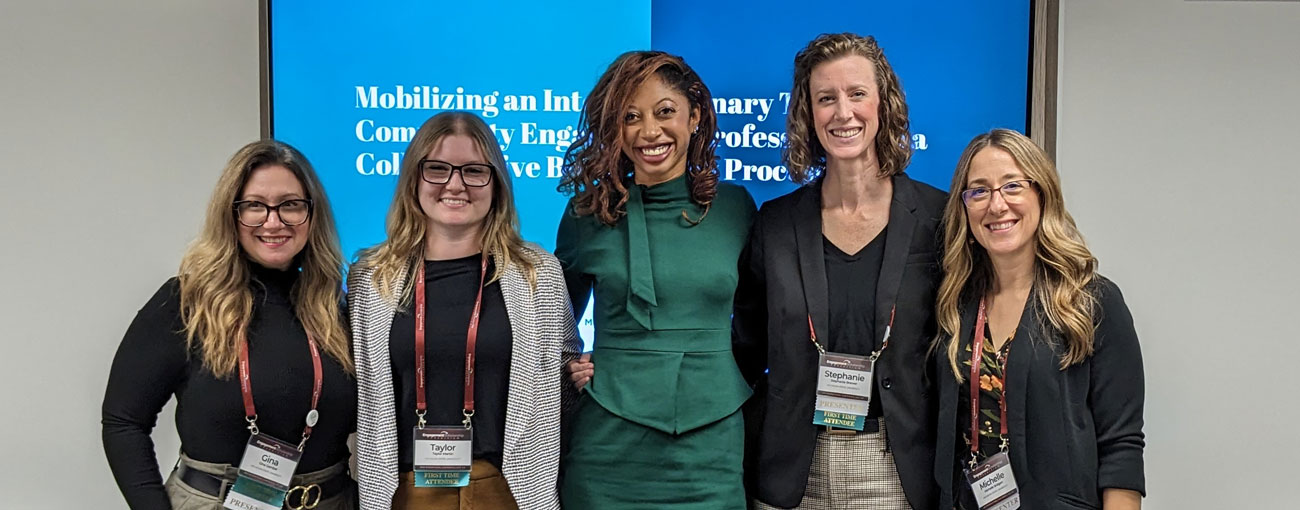Academic Community-Engaged Learning
CCEL's academic programs team supports faculty and staff who are designing course-based community-engaged learning experiences for students. This year, efforts included the facilitation of a faculty learning community, as well as the celebration of the 5th year of CCEL's Special Topics Series for faculty and practitioners to discuss academic community-engaged learning at MSU.

Continuing Education Program director Gina Tremonti Gembel, PhD candidate Taylor Martin, College of Education assistant professor Dr. Jada Phelps, and CCEL academic programs manager Dr. Stephanie Brewer, and CCEL assistant director Michelle Snitgen represented MSU in a panel discussion about Mobilizing an Interdisciplinary Team of Community Engagement Professionals in a Collaborative Book Review Process at the Engagement Scholarship Consortium International Conference hosted at the Kellogg Center in October 2023.
CCEL's Stephanie Brewer and Michelle Snitgen have co-facilitated a faculty learning community over the past three years, generously sponsored by the MSU Office of Faculty and Academic Staff Development. Over the course of 2023-2024, the "Expanding the Definition of Community-Engaged Learning: From Theory to Practice" learning community provided a space for interested practitioners to come together to read current scholarship on the various ways community-engaged pedagogy can be included in student learning experiences. The learning community focused on exploring an expanded definition of community-engaged learning utilizing the Social Change Wheel as a guiding framework. The Social Change Wheel, an equity-centered framework, outlines diverse pathways for faculty-practitioners to involve students in their coursework and deepen their understanding of course content through social change strategies, including philanthropy, advocacy, social innovation, and community organizing.
In addition to exploring an expanded definition of community-engaged learning utilizing the Social Change Wheel, the group collaborated to produce practical tools and resources for each implementation strategy (e.g., philanthropy, social innovation, community organizing), to be used by faculty/practitioners in the creation and facilitation of these pedagogical strategies. Discussions, resources, and tools were used to center equity and considerations of critical perspectives, and the group worked to further the conversation around an expanded definition of community-engaged learning and enhance the connection between theory and practice. Finally, the community presented their work at the 2024 MSU Spring Teaching and Learning Conference, hosted annually by the MSU Center for Teaching and Learning.
CCEL's academic programs team also celebrated the 5-year anniversary of the innovative Special Topics Series for faculty practitioners, which allows participants to learn about designing or enhancing preexisting community-engaged projects while connecting to a network of peers and a cadre of resources. Since the beginning of the series, over 650 faculty, staff, graduate students, and community members have participated. This year, CCEL hosted six Special Topics sessions, including topic areas such as the Social Change Wheel; The Elements of Community Partnerships; Rubrics, Reflection, and Resources; The Community-Engaged Syllabus; and The Student Experience.
To learn more about how CCEL supports academic community-engaged learning, visit the faculty page of our website or contact Michelle Snitgen at msnitgen@msu.edu or Stephanie Brewer at sbrewer@msu.edu.
in community-engaged learning as part of an academic course or program
Student survey of community-engaged learners:
reported they improved their critical thinking about issues
reported they learned about cultures different from their own
reported they critically reflected on their own values and biases
reported improved written communication skills, verbal communication skills, and problem-solving skills


